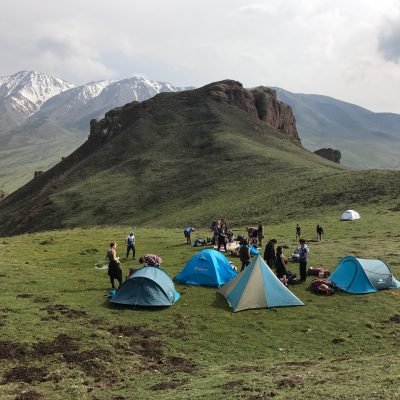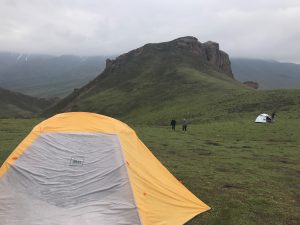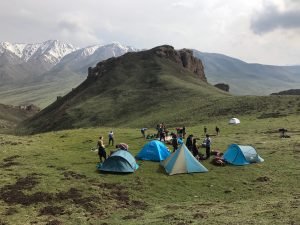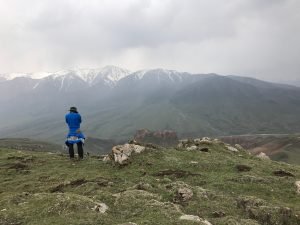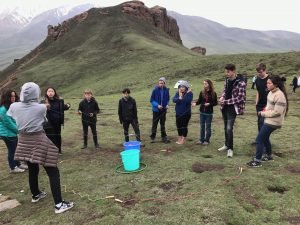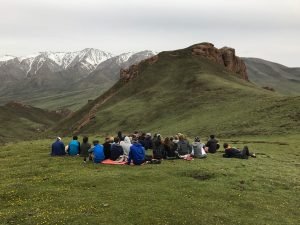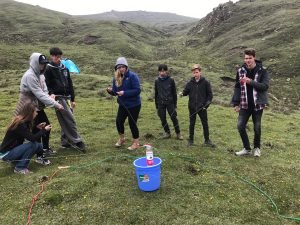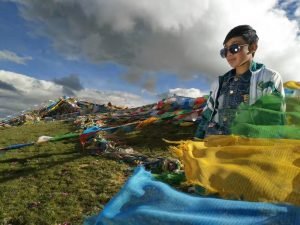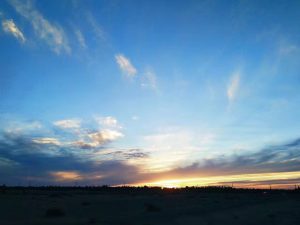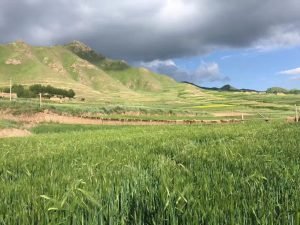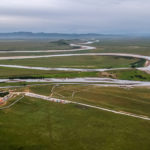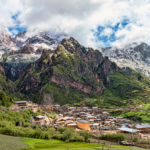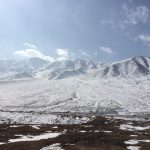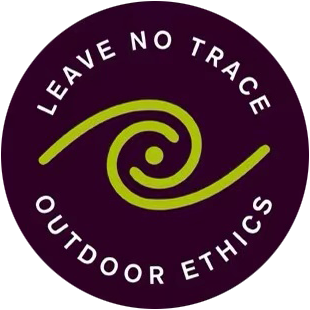For expats and their kids, life in China can often be very strange while living with unfamiliar customs, traditions, and rhythms that are so different than those they are used to in their home country.
For this reason, many expat kids are often called TCK’s or Third Culture Kids.
This term implies that these youth are not part of the culture of their birth country (because they do not live there and have grown up in a foreign country) and are not fully assimilated into the foreign country either (because no matter how much of the language they speak locally, they are still considered “outsiders” by the locals).
Thus these youth exist in a strange “purgatory” between worlds, striving to understand where their home and identity is.
In the city we live in in western China, there is a group of about 30 teenage youth who face such similar questions in identity and belonging in living abroad.
On the weekend of June 16-18, Elevated Trips took these energetic youth out for a team building retreat with a focus in creating unity among a group from as diverse nations as: New Zealand, Germany, Switzerland, Holland, Korea, and America.
On Friday afternoon we took a bus from Xining to the mountains of LaJi Shan. It was about a 1.5 hour drive and we stopped at a high pass along the road for pictures of prayer flags and views dropping dramatically 1000 meters into the below river valley.
As soon as we stopped all the teens piled out of their bus and were exploring the area and doing pull ups on the rafters of a local wooden terrace that provided great views to the green pastures below us.
From the high energy and enthusiasm of these youth, I could tell this was going be an exciting weekend with no small amount of laughter and activity.
After our stop at the pass, we loaded back into the vans and drove another 15 minutes to our trailhead.
We parked under two tall red rock pillars at 3,400 meters. After unpacking our backpacks from the buses, we played a classic warm up game that is always good for getting the limbs moving after a long bus ride: Run and Scream. All 30 youth lined up facing me and when I said “Go” they all took off screaming. The object was to run as far as possible using only one breath to produce the longest, loudest scream possible. Once their one scream ran out they stopped in their place. Some of the kids made it almost 70 meters on one breath- an impressive distance for a lack of oxygen. Then we played “ Kick the Shoe”. Here the kids loosened their shoelaces and they competed to see which of them could flick their shoe the farthest while standing still on a starting line. It was a blast to see all color and manner of shoes flying willy nilly across the Tibetan grasslands. After almost getting hit by a flying shoe and seeing the nearby pika scatter into their holes, we measured the distance and declared a winner.
And that was the beginning of our weekend together. From there we gathered our bags and circled up to talk briefly about the schedule and purpose of the weekend.
From the very start, a high level of functionality and performance existed in the group. These were kids who, among a land of unknowns and constant transition, held strongly together. One of the students had just recently broken their collar bone and was unable to carry his 35 pound backpack to our campsite. Without even asking for volunteers, people stepped forward to carry the contents of his bag so he could walk free without weight on his shoulders. This level of self-sacrifice and helpfulness is often a landmark we work to reach at the very end of such a trip. Yet from the very beginning these tight knit youth were already demonstrating positive traits of selflessness and teamwork that go against the usual current often found in self-preserving, comfortable, entitled modern teens. The kids even pitched in to carry extra weight, including fire wood for a camp fire, extra water, and extra food.
It was about a 40 minute walk up to our campsite at 3,800 meters with full packs. The kids handled the walk with ease. As I needed to show the kids the campsite, I was at the head of the pack with kids and chaperones trailing behind all along the short walk up from the trailhead.
As soon as we arrived at camp, there were about 6 of us and we were all quite tired from the short trek at altitude. I put my pack down and drank some water. I expected the teens around me to do the same. Instead, they threw their packs onto the grass and immediately turned around to help those who were slower on the hike. I was very impressed by the initiative. Again- I had not said a word and this was their own idea.
Within 15 minutes all the teens were shuttling packs back and forth from the bottom of the hike to the top. Some of the teens made 3 or 4 trips up and down the mountain to help their more tired peers. In this way, everyone got up relatively quickly and in high spirits. It was amazing to see the level of action and performance in this rare group! It truly proved the African proverb, “Many hands make light work.”
We all rested a bit and set up our tents in the high grassland. Then we separated into cook groups and worked together to light the camp stoves and cook chili by our campsite. I gave the safety briefing on how to properly use the stoves (and reminded them that if they spilled the food in the grass they still had to eat it) and the groups divided to separate areas of the site to cook up their well deserved dinner. I often see cook groups and tent teams learn as much about leadership, teamwork, and potential through these activities as in any intentional team building game. And this was no less true on this camping trip. Putting up a tent together is a task that requires problem solving and communication, especially as many of the participants may never have slept in a tent before. Cooking together yields similar results. With proper direction and modeling, allowing students to use stoves and prepare food in the backcountry teaches them new skills that they never thought were capable of. Suddenly they have a greater level of confidence and a greater awareness of their potential. All because they boiled some water, made some chili, and created a “home”without any of the modern conveniences found in their own room or kitchen. I love seeing the lights come on as they figure out together how to get the tent fabric taut and perfectly rainproof or to see the joy of being able to eat something that they made themselves!
After dinner, we had a teaching on unity and then played 4-way capture the flag in the dark.
Although it was just a fun game where we were sneakily stealing shoe laces from the other teams, this was another subtle lesson in unity and each team worked together marvelously to accomplish their unified goal of getting the most points without being caught.
In the morning the kids slowly arose from their tents to brisk, chilly air under an overcast sky. We ate a breakfast of homemade banana bread. Some of the more curious teens hiked 15 minutes up a nearby red rock cliff to get a better view of the surrounding 4,500 meter mountains. Our campsite – nestled in the nook of a grassy knoll- looked directly across to sharp, craggy mountains and it made for a great view! With the morning dew hanging about and the sun refusing to come out, I lit a small fire and used some of the wood we had brought up from the trailhead. Immediately the youth huddled around the fire for warmth and somehow the S’mores came out and everyone started eating warm, gooey marshmallows and S’mores for breakfast. I can’t say if this is recommended as part of a balanced diet, but it sure did help to warm up everyone’s bellies and brighten their spirits from the overcast weather.
With that, we had another teaching on unity and togetherness and then played a game to help us put the teaching into practice. The game was called “Toxic Waste” and involved working together to move a bucket full of “toxic waste” from the starting location to a “safe zone” about 50 meters away. The trick was that the students had only a few long strings and a giant rubber band to do it with and they were not allowed to touch the the bottle or bucket at all. If the toxic bottle inside the bucket touched the ground the whole team had to start over. We divided the youth into 2 teams of 15 people each. Each team was competing against the other to devise a clever way to move the bucket and bottle without touching the “harmful chemicals” or letting them drop.
I have played this game many times with both adults and youth and the outcome and creative process is different every time. But this was, hands down, the most exciting conclusion of the game I have ever seen. After 1.5 hours of struggling and problem solving, both teams managed to lift and carry their toxic waste bucket within 1 meter of the finish line at the exact same time. Both teams were rushing to beat the other team (and in a crowded workspace) to get their bucket to the safety zone. In the madness of hurried competition both teams accidentally dropped their bottle just a few centimeters from the proper safe zone and had to start again. My heart sank as I had to watch them return to the starting line after being so close. But eventually they figured it out and there was a clear winner.
After our heart-pounding team building adventure, we set off to summit a nearby mountain up to the 4,000 meter apex . It was only another 40 minute hike to the top from the campsite, but it was a pretty steep walk up the side of the grassy ridge. At times, it felt like we were walking up very steep attic steps as we stepped from one grassy clump to another grass clump at another level. I was very proud of all the students. Despite the fatigue at altitude, they all made it and did a great job encouraging each other up to the top. At the top, we all had a lunch of pepperoni, cheese, and crackers and then we allowed the students to have some free time. Some chose to walk back to camp and rest and some explored other aspects of the ridge and its surrounding peaks in the afternoon.
By the time we made it back to our camp, the skies had opened up and it had started raining. It was now 5:00pm and I knew we had to get the water boiling to cook the pasta for dinner. I asked for volunteers from each cook group who would not mind standing out in the cold rain to cook dinner. I found several eager volunteers who were in high spirits despite the murky weather. We all worked together and boiled about 5-6 pots of water and made the pasta and sauce while everyone else retreated back to their tent to get warm.
Eventually the rain stopped for a few minutes and everyone was lured out of their warm tent by the prospect of hot food. We ate and cleaned the dishes quickly. And then it started raining again. Everything in camp was wet as the rain continued to pour down steadily all night long. I had prepared other lessons and games for that night, but the weather dictated that I put my plans on hold. I always say on these events that we hope and pray for good weather. But God knows really what we need and He always gives it to us. In this case, the rain actually thwarted my plans to teach but ended up sending everyone into their tents. This turned out to be a real highlight for everyone in camp, because all the youth piled into their tents and played cards, told jokes, and laughed about the day. Every tent was lit up with flashlights and produced a large amount of giggles and exhilarating stories. I can only imagine that those kids will remember the good times they had that night tucked away in those cozy tents so much more than anything I would have said to them about unity. Whereas I wanted to talk about living out of unity and respect, they were all living it as they huddled and whooped and chuckled in their tents.
The next morning, the rain stopped, but it was still quite damp and wet. We played a team building game where each team had to see how many times it could consecutively hit a ball without dropping the ball or letting it touch the ground. And then we packed up our soggy tents and put our sleeping bags in our backpacks. Camp was all packed up slowly but surely.
And we made a huge pile of all of our gear in the middle of the camp. Next to the huge pile of gear was all the leftover food from the weekend. It was a motley assortment; potato chips, brownies, whole carrots, crackers, pepperoni, cheese, Cheetos, fruit leathers, marshmallows and who knows what else. But we told the kids that they had brought this stuff up the mountain and that their packs would be lighter on the way down if they ate it all. And they got the message. The group crowded around the pile of random leftovers and did what only a group of hungry, motivated teens can do in such a situation. They nearly finished everything that was left!
With that, we swept the campsite for trash and food scraps, swung our backpacks on, and descended the mountain to the trailhead.
I had only completed about half of my planned teachings and activities due to the inclement weather. But somehow along the way, the students had harmoniously lived out much more than just good concepts or ideas on unity. They had, from the very beginning, shown an incredible aptitude for team work. And I had a feeling these were lessons they would all remember and live out for a long time. This was so much greater and more valuable than any text book knowledge or paper test they would ever take. The difficult conditions had brought them together to really work as a unit and show care for each other. And that, to me, made the weekend an incredible success.
